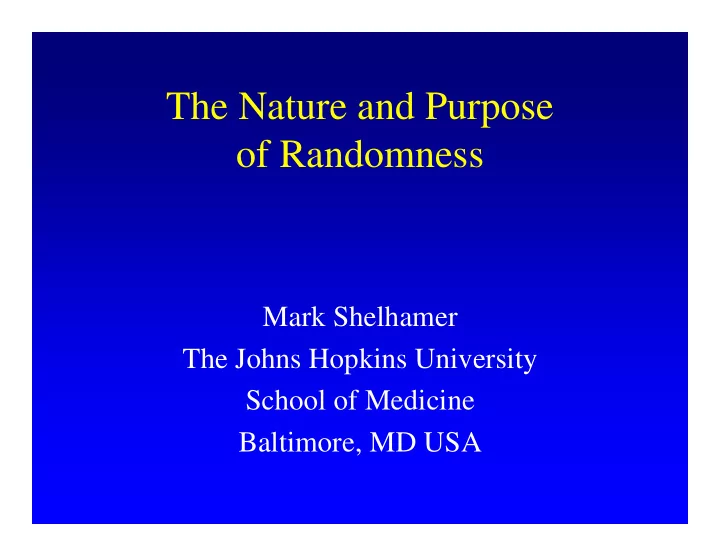

The Nature and Purpose of Randomness Mark Shelhamer The Johns Hopkins University School of Medicine Baltimore, MD USA
A Sense of the Problem • Evolution via natural selection is based on random mutations. • How can we be the end result of God’s master plan if we are the product of random chance?
Perspective • Sometimes random is not really random – Chaotic dynamics – Sometimes it is lack of understanding (Kalman) • Randomness is not intuitive • There are, however, processes that truly are random – Timing of radioactive decay (Hot Bits)
Perspective We appreciate the beauty and elegance of physical laws, and also mathematical laws, which offer powerful explanations of the physical world and demonstrate its underlying order. There are rules governing randomness as well, and these too are beautiful and orderly.
Misunderstanding of probability may be the greatest of all impediments to scientific literacy. – Stephen Jay Gould I know of scarcely anything so apt to impress the imagination as the wonderful form of cosmic order expressed by the law of frequency of error. It reigns with serenity and complete self-effacement amidst the wildest confusion. The larger the mob, the greater the apparent anarchy, the more perfect is its sway. It is the supreme law of unreason. –Francis Galton http://en.wikipedia.org/wiki/Image:Standard_deviation_diagram.svg
Randomness is not Intuitive Humans are bad at generating randomness - tendency to alternate - tendency to neglect extreme values Fortunately, there are reliable sources of randomness
Randomness is not Intuitive We are bad at judging randomness 1 1 0.8 0.8 0.6 0.6 0.4 0.4 0.2 0.2 0 0 0 50 100 150 200 0 50 100 150 200 1 1 0.8 0.8 x(i-1) x(i-1) 0.6 0.6 0.4 0.4 0.2 0.2 0 0 0 0.2 0.4 0.6 0.8 1 0 0.2 0.4 0.6 0.8 1 x(i) x(i)
Randomness is not Intuitive Gambling and gambler’s fallacy - bet on the next flip of a fair coin: HHHHHHHH Entire industry built on this misunderstanding
Fractals A deterministic fractal – the Koch Snowflake
Fractals A deterministic fractal – the Mandelbrot Set http://commons.wikimedia.org/wiki/Image:Mandel_zoom_00_mandelbrot_set.jpg
Random Fractals: order in randomness A random fractal – coastline B Mandelbrot (1967) How Long Is the Coast of Britain? Statistical Self- Similarity and Fractional Dimension. Science 156:636-638. http://commons.wikimedia.org/wiki/Image:Britain-fractal-coastline-combined.jpg
Random Fractals: order in randomness A random fractal – mountains http://www.javaworld.com/javaworld/jw-06-2007/images/jfgfigure8.gif http://www.vb-helper.com/vbgp/fractal_surface.gif http://www.effectware.com/download/images/efx_mountain2.jpg http://www.wizardnet.com/musgrave/cool2.jpg
Random Fractals: order in randomness A random fractal – lungs http://classes.yale.edu/fractals/WorldOfFractals/Us/Lungs/Lungs.html
Rare Events are not necessarily Abnormal Richter scale and earthquake distribution – what is a “rare” event? http://www.seismo.unr.edu/feature/NVrank.html
Good Things Brought About by Randomness • Jansky – galactic noise source • Penzias & Wilson – cosmic background • Brownian motion and the atom (Einstein)
Randomness Can Serve a Purpose • Monte Carlo simulation – Probabilistic simulation of complex systems – Generate random stimuli and catalog the responses • Example: area of a circle • Fill 1 x 1 square with random dots • What % fall into the circle?
Randomness Can Serve a Purpose • Genetic algorithm – Optimization of multivariate system – Random generation of candidate solutions – Random selection and mutation – Avoid local minima – Efficient search of solution space M Shelhamer (2001) Use of a genetic algorithm for the analysis of eye movements from the linear vestibulo-ocular reflex. Ann Biomed Eng 29:510-522.
Randomness Can Serve a Purpose • Stochastic resonance – Reduction in threshold – Additive noise in certain range http://accessscience.com/loadBinary.aspx?filename=YB980590FG0020.gif
A Note on Information • What is information ? – Reduction of uncertainty – Shannon entropy E P log 2 ( P ) i i i
Conclusions • Randomness is a law as fundamental to how God runs the universe as any other physical-mathematical law we know. • Mathematics and physical laws demonstrate a (Divinely Ordained) universal order. • Despite our subjective sense, randomness has a beauty and order of its own. - Therefore randomness should be embraced as one of God’s organizing principles. ON THE OTHER HAND • Divine Intervention might be completely deterministic and orderly, and our limitations prevent us from seeing this. • But would a benevolent God do this?
Evolution and Constrained Variability • “The potential interactions between chance mutation, environmental pressure and individual survival are so numerous and complex as to constitute a system whose future states are impossible to predict.” – Doing it over again would lead to a different result, so how can we be God’s desired end product? – This is contingent evolution. • But there are convergent solutions (dolphins and fish) – The process is not contingent but constrained. – “The selective advantages of advanced intelligence are so vast that its emergence in this particular universe, which itself appears uniquely hospitable to life, may indeed have been inevitable once the evolutionary process was started. In this sense, then, the emergence of intelligent, morally responsive life can reasonably be thought to have been an integral feature of our universe from its inception.” WT Newsome (2001) Life of faith, life of science. Proceedings, Science and the Spiritual Quest.
Randomness is not Intuitive http://pro.corbis.com/search/Enlargement.aspx?CID=isg&mediauid=EC30F102-0ECD-45E2-A9E2-5B426A44DE8B
Randomness is not Intuitive “There are no such things as coincidences” – BUT If God has ordained the laws of randomness just as much as the deterministic laws of physics, we must expect coincidences. Example: How large must a group be to have the probability of finding two people with the same birthday at least 50%? 23
Recommend
More recommend